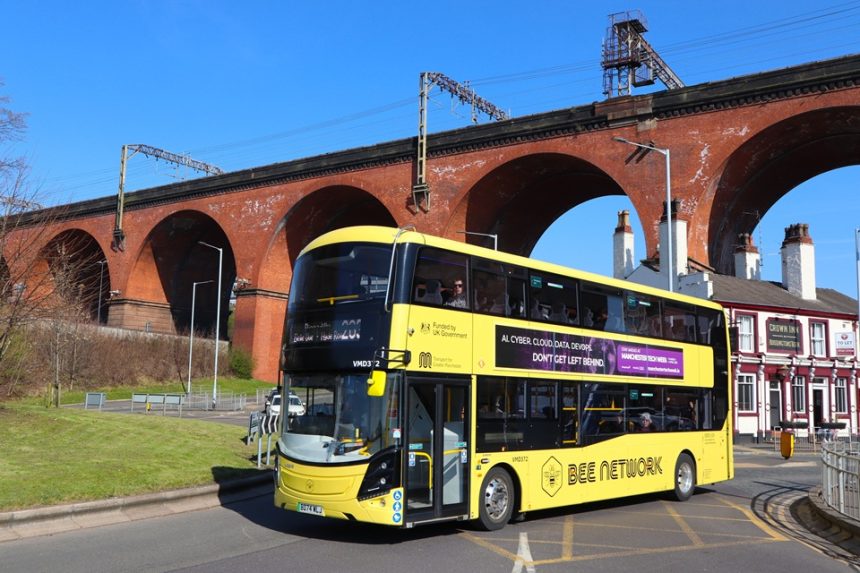Transition of bus services in Greater Manchester to the franchised Bee Network completed in early 2025. Behind the scenes, much other work is in hand. It is led by Transport Commissioner for Greater Manchester Vernon Everitt, who while acknowledging that the operation is not yet where he wants it to be, says that plans are legion to ultimately get it there.
Vernon has a long transport career, including many years in senior positions with Transport for London. In June, he was named preferred candidate to chair Transport for Wales (TfW) as it moves into the bus franchising field, a role that will sit alongside his work in Greater Manchester.
Ongoing costs of the Bee Network have drawn comment from some sources. Data recently published by Transport for Greater Manchester (TfGM) shows how 47% of those in the current financial year will be recovered via the farebox. Local taxation captures a further 29% of the £390 million of total expenditure in FY2025/26.
Against that, revenue for FY2024/25 exceeded projection and the FY2025/26 budget was reset as a result. The additional money in the overall pot will be invested in service improvements, something that might not happen under a deregulated model, Vernon suggests.
“If you just looked at [the Bee Network] through the lens of a profit and loss account, a number of the things we are doing would probably not be done on a commercial basis,” the transport supremo notes. “But I know of no bus network anywhere that does not require some form of public subsidy.”
That is no criticism of operators in the deregulated field, he adds. But Vernon echoes Mayor of Greater Manchester Andy Burnham in arguing that without franchising, the city region would end up with a smaller bus network delivered at a higher cost. Yet the act of providing a transport service is not the overarching key to an integrated Bee Network, he says. Instead, it is an enabler of economic and social activity in a growing conurbation.

Data is driving service revisions for the Bee Network
The present Bee Network map is largely comprised of services inherited from the previous regime, with some amendments. Timetable changes are more obvious, and about 80 routes have seen schedule alterations since becoming franchised.
In the northern part of the region, two now run 24/7 to complement such longstanding provision in the southern arc. Ultimately, TfGM wants all-night timetables on all major corridors. Vernon expects that work to progress further in 2025.
Network-wide revenue and patronage data was not available to TfGM pre-franchising. It now being on hand is one of “the great benefits” to franchising, he says, and that will drive a holistic view on service changes. Also feeding in is community engagement, with network reviews planned across each of the three Bee Network tranches.
TfGM wants 30% growth in bus usage by 2030 on 2022/23 levels. The level of ambition in that is accepted by the body, but Vernon observes how the first two tranches saw a 14% year-on-year uplift to March.
While that is not a direct byproduct of franchising and similar figures have been recorded elsewhere, he believes that a commitment to holding down fares and integration with rail-based modes, and wider data availability to inform network development, should maintain the trajectory.
Working hard on journey time reliability
Mitigating the impact of congestion is core to driving patronage and building the Bee Network. TfGM is developing an operational excellence plan to capture what is needed raise punctuality, although Vernon notes how the metric has improved under franchising, albeit helped by additional vehicles in the network.
Highway management is front and centre for punctuality. Two-thirds of delays to bus services in Greater Manchester are from roadworks. TfGM is making a case to government for lane rental powers to incentivise utility companies to complete tasks quickly, and local authorities within the city region are installing red routes as part of an extensive plan to speed bus services.

Illegal parking is another problem. It can sometimes be quelled by the simple measure of repainting faded yellow lines. But in a growing conurbation like Greater Manchester, where development and events are widespread, there is no simple answer to road space utilisation, Vernon suggests.
“If it was easy, we would have done it already. There are hundreds of interventions to make: Relining, laying red routes, getting lane rental in place, and taking a different approach to managing big event days in Manchester.”
Bus priority has not been forgotten. Traffic signal optimisation has been deployed, but long-term local transport funding means that a pipeline of capital projects is in hand over the coming years. Among those are segregated bus-only sections of road surface.
Consultation on how that will work on the Ashton-under-Lyne to Oldham and Rochdale corridor is in hand; a larger programme of other measures will follow, TfGM says.
Electrification: A challenge, but industry getting better quickly
Since routeone spoke with Vernon, work to fully electrify the Bee Network bus fleet by 2030 has solidified thanks to the long-term transport funding allocation to city regions in England. That timeline was already an aspiration, and it is deliverable despite some complexities at depot level, he believes.
One in four buses will be battery-electric by the end of 2025. A solitary repowered example is already with Go North West, and Vernon hints that more may follow via an observation that disposing of “perfectly good buses” in pursuit of the zero-emission agenda is not ideal.
Infrastructure complications have come at older legacy depots. The Bee Network operating centre in Stockport needs to be replaced to enable electrification of that town’s fleet, but Vernon observes that charging infrastructure has been delivered successfully at garages of similar vintage.
“You have to take care if the decision is to relocate a depot; many of them are where they are because it makes sense in terms of the services they deliver,” he adds. That the bus industry and its partners are rapidly getting better at rolling out zero-emission infrastructure at scale even in more complex scenarios is another consideration.
“Electrification of depots is undoubtedly a challenge. Anyone thinking of going for franchising needs to factor that in. But I am confident that we will get there in a way that does not inhibit the move to zero-emission.”

Cross-authority collaboration continues
TfGM works closely with other Combined Authorities on franchising. TfW officials have also visited, and Andy Burnham has engaged with Strathclyde Partnership for Transport on reregulation. As the elected mayor approach spreads, communication and knowledge sharing with other authorities may expand further.
How many non-Combined Authority or equivalents ultimately choose franchising remains to be seen. Vernon believes it makes sense in Greater Manchester because it sits alongside integration of bus services and Metrolink light rail and, later, parts of the region’s heavy rail network. His position is that full integration and delivery of the oft-cited London-style system cannot happen without public control of bus services.
“You need to define the network and the fares,” he says. “If you want a London-style approach, you require a daily fare cap that includes buses, trams, trains, and anything else that is added in there.
“For us, integration meant that bus franchising needed to happen. I believe that is probably why some other Combined Authorities have taken the same route – because they want to integrate buses with their trams, trains, and active travel networks.”

Preparation for franchise handover is key
Other areas that adopt franchising will lean on Greater Manchester’s experience directly or indirectly. Some is already factored into the Bus Services (No.2) Bill. That legislative change in England will streamline the preparation phase, but Vernon cautions that mobilisation is a highly challenging part of the transition.
“We did it in three tranches, but keys change hands overnight. The sheer logistics of that need to be planned in a meticulous way,” he advises. “Expect things to go wrong, because the handover is very complicated.”
Few would predict anything else from a seismic shift in how bus services are delivered, and authorities that progress franchising need to do so with their eyes open. A strong relationship with bus operator partners is paramount.
In Greater Manchester, that is described as “businesslike but collaborative” by Vernon, and he credits it with being a major factor in overcoming hurdles when they arise. While much has been said about bus franchising in the region, it undoubtedly serves as a blueprint for what will soon be seen elsewhere.


























